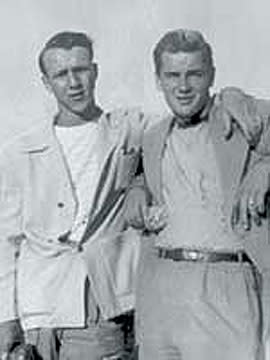How tragedy shaped the early golf career of Arnold Palmer

Way back in the late 1940s, the Wake Forest golf team lost out in its bid to qualify for a college tournament. Duke's coach offered Wake the "honor" of caddying for the Blue Devils in the tournament. (Duke: always classy through the decades.) Wake's coach was so incensed that he started building his own golf powerhouse, recruiting a golfing prodigy from up north -- and also a kid named Arnold Palmer, who was almost as good. Palmer and his best friend, Buddy Worsham, led the Deacons to three Southern Conference titles.
As Howard Sounes recounted in his book Wicked Game, Worsham was from a golfing family -- his older brother, Lew, won the first live televised golf match in U.S. history in 1953. Buddy talked "Arnie" into attending Wake Forest, and it was there that the two bonded over golf, politics and the high life.
But one night in 1950, Buddy and a friend drove into Durham; they invited Arnie along, but he declined. The next morning, he awoke to learn that both Buddy and the other boy had died in a wreck, and Palmer had the grim responsibility of identifying the bodies. Palmer has kept a photo of Buddy in his office ever since.
As a result of Buddy's death, Arnie eventually left Wake Forest and joined the U.S. Coast Guard, where he would serve for three years. He attempted to return to school, but golf crowded out his studies. By 1954, he was selling paint supplies, and decided to take one last shot at golf ... and we've already seen how that turned out.
How would Palmer's career have been different had Buddy Worsham lived? Would Worsham have capitalized on his own golf promise? Worsham's tragic passing forced Palmer to consider what he valued most in his own life, and gave him a grounding that he's passed on to generations after him.

